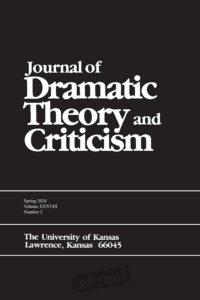Journal of Dramatic Theory and Criticism, 38.2
This special section included articles by Joy Brooke Fairfield, Enzo E. Vasquez Toral, Rüstem Ertuğ Altınay, Bess Rowen & Benjamin Gillespie, Payne Banister, and Sam N.W. Blake.
 Opening to My Introduction to the Special Section
Opening to My Introduction to the Special Section
In March 2023 Tennessee governor Bill Lee signed a law that widely came to be known as a ban on drag. News articles and social media discussions describing Tennessee’s drag ban caused outcry. The status of this law remains contested, and though it was blocked by a court order, the state of Tennessee has appealed to a federal court, and the ban may go back into effect any day. The law in Tennessee was followed by similar laws in Montana, Arkansas, North Dakota, Florida, and Texas. These laws have been understood by LGBTQ+ activists as a specific attack on trans people and trans identities. Indeed, that these laws accompanied other anti-trans legislation in the same states makes their trans-antagonistic character more apparent. But the language of these laws does not always explicitly mention drag. Although, for example, Tennessee’s law describes performances by “male or female impersonators,” Florida’s law prohibits “exposing children to an adult live performance.” Florida’s law specifically targets businesses with food and beverage licenses. Soon after the law went into effect in Florida, where I live and work, I attended the Orlando Fringe Festival, and at one of the performance venues in downtown Orlando a sign was prominently posted warning minors not to enter—as a protective measure for the restaurant.
What immediately fascinated me about these laws is that, although the legislators are all deeply conservative and invested in trans-antagonistic legislation, their attacks on trans people and trans identities should hinge on performance. That is, lawmakers attempted to make it illegal to perform as a person of a different gender or to “impersonate.” In Florida gender impersonation isn’t the apparent target of the law but something called adult live performance. Again, here, the hinge is performance. It has seemed to me that in the phrasing of these laws, trans people, drag queens, and other gender nonconforming people become targets of the state as soon as their activities become theatre. As the discipline of performance studies has argued since its inception, however, almost anything and everything is performance. What’s more, many of our trans-antagonistic lawmakers have mobilized precisely this language, perniciously contrasting their understanding of “real” gender with false, deceptive, theatrical performances. The law—like performance studies—finds it useful to describe something as performance as one way of bringing it under its jurisdiction.

